On Wednesday, August 11, Dr. Alireza Zali, the director of the Tehran Coronavirus Taskforce, revealed that the Islamic Republic had lied to the World Health Organization (WHO) about Covid-19 fatalities and exposed the failures of a number of government officials in the fight against the pandemic.
The revelations come amid rising infections and deaths across the country from the Delta variant, and as Iran’s already-fragile health system continues to buckle under the strain. According to the health ministry’s statistics, a total of 3,587 people lost their lives to Covid-19 in the week ending August 12. A hospital boss in Isfahan has also warned that potentially fatal cases of black fungus infection in children, linked to Covid-19, are on the rise.
Zali’s statements revealed some important lies and shortcomings but left many questions, especially about vaccines, unanswered.
***
Since the coronavirus pandemic started in Iran, Dr. Alireza Zali, president of Shahid Beheshti University of Medical Sciences, has been the director of the Tehran Coronavirus Taskforce. During Iran's five coronavirus outbreaks, Zali repeatedly asked the National Coronavirus Taskforce for Tehran to be quarantined or locked down, regarding it as a key center of the contagion, but each time his request was rejected.
Dr. Zali keeps the Covid-19 situation in greater Tehran under close supervision, being sure to provide the media with updates. However, on August 11, in a change to his usual briefings, he attacked the policies of the Islamic Republic regarding the fight against coronavirus, and specifically regarding the importation of Covid-19 vaccines. He revealed that Iran had concealed the true number of Covid fatalities from WHO and, instead, had asked the organization to praise Iran’s health system when speaking to the media. “We turned international aid back from the airport – and Doctors without Borders,” he said.
In particular, Zali highlighted the failure of Iran’s foreign ministry regarding vaccines.
Shirking Responsibility?
“Mr. Zali should have said these things much earlier,” Mohammad Reza Mahboubfar, a health expert and analyst in Tehran, tells IranWire. “It is too late to say these things at a time when, sadly, Iran has turned into the coronavirus slaughterhouse of the Middle East, and perhaps the world. I believe that such statements by Dr. Zali about the situation of the pandemic in Iran and across the country does not clear him of responsibility because he is a key figure within the National Coronavirus Taskforce.”
“Our ambassadors to foreign countries weren’t trying to get hold of vaccines,” said Dr. Zali. “I talked to the Japanese ambassador and he said that the Iranian ambassador never asked for vaccines. What kind of diplomacy is this?”
“Mr. Zali is addressing Mohammad Javad Zarif and his ambassadors to various countries in the world,” says Mahboubfar. “And Mr. Zarif responded that any vaccine that had been imported had been the result of the foreign ministry’s efforts. It would appear that Dr. Zali lacks adequate information about imported vaccines. I consider him a spent force at the National Coronavirus Taskforce. I have even heard that, contrary to what has been said, he has never attended National Coronavirus Taskforce meetings and he has not been given much of the information about the process of importing vaccines.”
Mahboubfar says it seems evident that these are Dr. Zali’s final days with the Tehran Coronavirus Taskforce, and he is trying to clear himself from the charge of “murdering” his fellow Iranians. People died as a result of failures by various ministries and government agencies, and Zali was part of this official management, or mismanagement, of the pandemic.
The Ban on Importing American and British Vaccines
On August 11, a few hours after a huge number of media outlets reported Dr. Zali’s statements, Mohammad Javad Zarif responded on Instagram. He dismissed Zali’s statements as “libel”, “slander” and “attacks” against the diplomatic service of the Islamic Republic. He instead pointed the finger at various other institutions and at the ban on importing American and British vaccines. He then put forth his own list of questions: “Who first brought up the issue of coronavirus within the government?...Which minister got the Sputnik vaccine from Russia?...Which government agency arranged for the acquisition and the gift of more than 24 million foreign vaccines and has arranged for the massive and continuous imports for the coming weeks?…On the other hand, who was it that rejected the plan to import 20 million doses of vaccines from Europe?”
“I believe that powers beyond the Ministry of Health denied permission to import 20 million doses under [the World Health Organization’s program] Covax,” says Mahboubfar. “They were the same people who made promises about a domestically-produced vaccine and said they would produce tens of millions of doses by the end of the summer. The 20 million doses mentioned by Mr. Zarif was from Covax’s supply and Covax wanted to provide Iran with reputable brands of foreign vaccines including Pfizer, Moderna and Johnson and Johnson, but unfortunately, thanks to a letter signed by a number of professors at the universities of medical sciences, they banned American and British vaccines from Iran.
“In February, the foreign ministry and the health ministry were ready to import vaccines. The plan was to import 12 million doses in the first phase and six million doses in the second phase, but institutions with higher authority than the health ministry prevented, claiming that the development of domestic vaccines had reached an acceptable stage, that clinical trials had been completed and that they were able to produce the vaccine within the country.”
It was in January that the Supreme Leader Khamenei banned the import of American and British Covid-19 vaccines. Following this announcement, 2,500 doctors and health professionals asked in a letter for a ban on the import of Covid-19 vaccines. The names of 194 of the signatories to the letter have been published. One of them was Bahram Einollahi, President Raisi’s choice to head the Ministry of Health.
“Isn’t it naïve to trust the lives and the health of our dear people as laboratory test subjects...to American and British vaccine makers, to the same governments that, in the past few decades have proven in different ways that they place no value on the health and the lives of Iranians?,” read the letter.
Supreme Leader’s “Revolutionary” About-Turn
On August 11, following the most recent uncontrolled surge of Covid-19 in Iran, the Supreme Leader described securing vaccines as “the country’s first and foremost urgent issue”. Kianoush Jahanpour, the spokesman for Iran’s Food and Drug Administration, announced that that importing American and British vaccines was permitted, provided they have not been manufactured in these two countries — a strange condition that can only have been an attempt to save face on Khamenei’s behalf.
Many criticized this reversal in policy, saying it was too late. Tens of thousands of Iranians had lost their lives due to a lack of the vaccine, they said.
In addition to the fiasco of refusing to import vaccines, the production of domestic vaccines has not been a shining success either. Tens of millions of doses of the CovIran-Barekat vaccine, produced by the Executive Headquarters of Imam's Directive (known as “Setad”), a foundation controlled by the office of Iran’s Supreme Leader, had been promised, but on August 10 the newly-inaugurated President Ebrahim Raisi announced: “Our domestic production is not enough and we must import between 30 and 40 million doses.” Kianoush Jahanpour announced that by the early autumn, 40 million doses will have been imported.
Fatemeh Karimkhan, a journalist based in Iran, tweeted: “Jahanpour said that within the next three months 40 million doses of foreign vaccines will be imported. There has been no change in sanctions, no change in currency reserves, no change in the enmity or the friendship of countries that make the vaccines. Why was the decision to import vaccines not taken six months ago? Three months ago? One month ago?”
“The Covid-19 crisis that has engulfed the country is a self-inflicted one and is primarily the result of self-imposed sanctions by the Islamic Republic regarding the ban on importing American and British vaccines,” says Mohammad Reza Mahboubfar. “In the past few days promises about importing 40 or even 120 million doses have been made but it is unlikely that these promises are true because, in a sense, Iran has no government. We only have a president and the ministers who are currently in the cabinet have a record of failures.”
The Fiasco of Domestic Vaccine Production
Mahboubfar says the domestic Covid-19 vaccines are a “montage” of Chinese and Cuban originals: “No innovation, no creativity and no new discovery has taken place in the development of domestic vaccines. As a result of sanctions and broken promises, even China, Cuba and Russia would not allow Iran to access the raw ingredients to produce vaccines domestically. That is why Iran has only managed to produce 1.3 million doses of the vaccine.”
According to Mahboubfar, in the past few months at least six pharmaceutical companies have informed the health ministry that the mass production of vaccines to fulfill the promises Iranian officials have made is impossible: “Unfortunately, instead of listening to domestic vaccine makers, the health ministry has even refused to permit private companies, inside and outside Iran, to import vaccines.”
He believes that the health ministry is unwilling to pay a price that it believes is too high.
Early this spring “we laid the groundwork to import six million doses of vaccine but the health ministry did not allow it,” reported Masoud Khansari, president of the Tehran Chamber of Commerce on August 12.
This is yet further evidence that the health ministry is opposed to importing vaccines. However, on July 25, health minister Saeed Namaki claimed his ministry “is not responsible for importing vaccines. Its job is to manage the contagion and administer the vaccines.” He reasserted this position and defended the performance of the health ministry on August 12 during a visit to Mashhad: “Our duty was not to acquire vaccines. Others had to import it and we organized the injections. But they broke their promises and those who had claimed to be our friends left us alone in the middle of a slaughterhouse.”
Dr. Zali’s revelations show that the officials of the Islamic Republic were willing to spend money on items like medicine for treating symptoms of Covid-19 but not only refused to spend it on importing vaccines, they even prevented others from doing so.
“We mustn’t obsess over the price of vaccines and buy them even at twice the price to protect people,” said Dr. Zali. “We spent €720 million on Remdesivir [a drug used to treat severe Covid-19] but we should have spent that on vaccines. How come, under sanctions, we can buy petroleum equipment at three times the price but not do the same for vaccines?”
Isfahan Hospital Boss Warns Black Fungus Spreading Among Children
Behrouz Kalidari, the deputy director of treatment at Isfahan University of Medical Sciences, reported that local hospitals have seen an outbreak of black fungus among patients with Covid-19.
The rare but serious infection affects the sinuses and facial bones and can cause sight loss or brain damage. When untreated, it kills 50 percent of sufferers.
On Friday, August 13, Kalidari told the Iranian Metropolis News Agency (IMNA) that more than 40 children had come down with the disease, mucormycetes, at Imam Hossein Hospital and three at the university’s hospital in Isfahan.
One of the cases, he said, was an eight-year-old child. Doctors had to remove parts of his cheek and eye in order to save his life. "The more people we have with immunodeficiency conditions,” Kalidari warned, “the more that opportunistic viruses such as black fungi are likely to spread."
Black fungus infection was first observed spreading among Covid-19 patients in India in May. Hospitals have since had to set up special units to treat thousands of affected people after they had recovered from Covid-19.
The US Center for Disease Control and Prevention has warned the infection is “highly aggressive” and should always be treated immediately.
In June this year, Massoud Mardani, a member of the National Coronavirus Headquarters’ scientific committee, had also said cases of black fungus had been observed in Tehran.
Official Coronavirus Statistics
According to the health ministry’s weekly statistics, a total of 3,587 patients are known to have lost their lives to Covid-19 in the week ending August 12: an increase of 1,033 over the preceding week’s death toll of 2,554. With 588 deaths, August 9 had the highest officially-recorded number of fatalities for the week.
At the week’s end, 7,048 Covid-19 patients in Iran were being treated in ICUs. At the time of writing, according to the health ministry, 3,531,142 Iranians had received both doses of the vaccine.
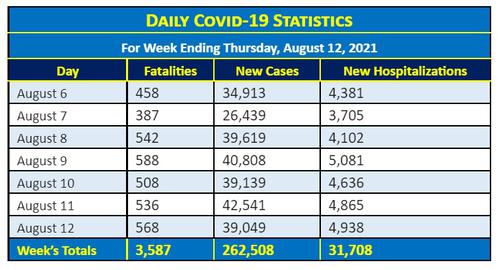
There are currently 336 Iranian cities on red alert for coronavirus transmission. Another 84 are rated orange and 28 are yellow. No city in Iran is currently on “blue” alert.
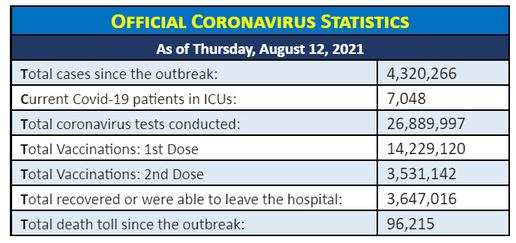
Related coverage:
Tehran Coronavirus Lead: Iran Hid Fatalities From the WHO
Khamenei Changes Position on Covid-19 Vaccines
Iran to Hold Shia Mourning Ceremonies Despite Record Covid-19 Infections
Cash-for-Beds Rackets Exposed as Delta Variant Overwhelms Iranian Hospitals
Tehran: Army Beds Repurposed as Hospitalized Covid-19 Patients Reach 10,000
Exclusive: Iran Vaccinating Lebanese Hezbollah
No Beds in Hospitals as Iran Faces Fifth Coronavirus Outbreak
A Quarter of Iranians Believe They Will 'Never' be Vaccinated Against Covid-19
Iranian Health Officials Slam "Jerks" for Criticizing CovIran-Barekat Vaccine
visit the accountability section
In this section of Iran Wire, you can contact the officials and launch your campaign for various problems




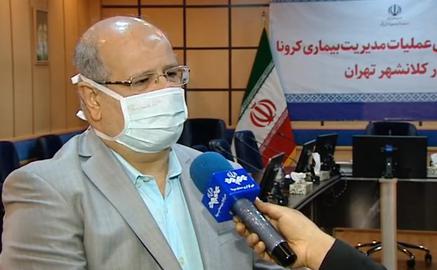
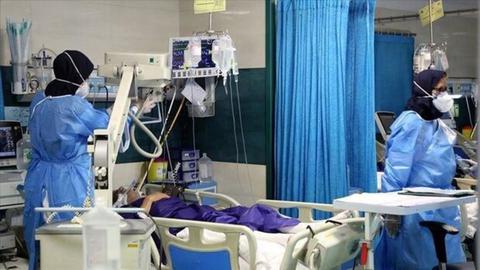
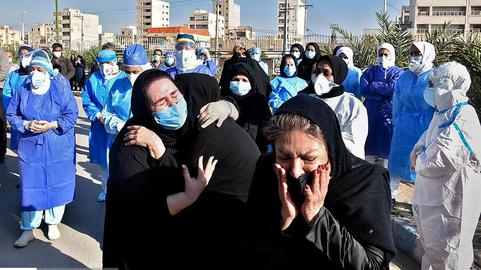
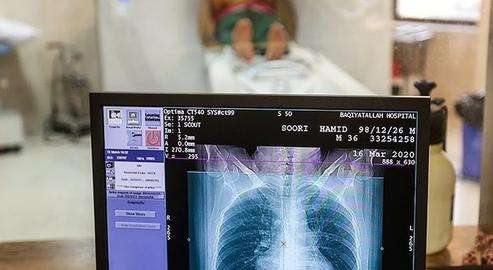




















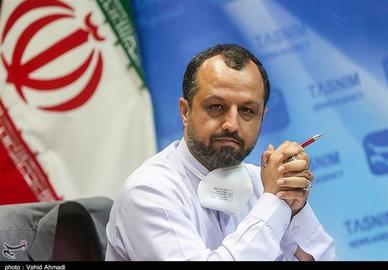
comments